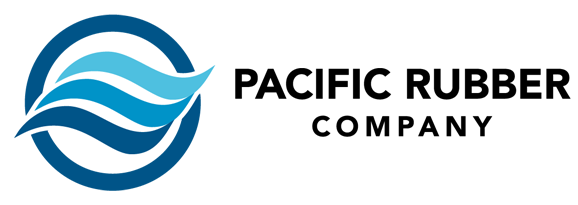Cloth Inserted Rubber
Cloth-Inserted Sheets are designed for ventilating systems and for flange joints for water or brine systems to withstand 250 pounds of pressure.
A typical application is a flange gasket in which the compression loads are so high that non-reinforced rubber would squeeze or extrude out between the flanges. Made in the USA.
The term “cloth-inserted” (CI) sheet rubber refers to rubber that has a cloth woven into it in order to achieve excellent dimensional stability while die cutting components with precise tolerances. Numerous common fabric inserts are available from Pacific Rubber Company in a variety of polymers, including SBR and neoprene. Regular and decreased cotton and polyester plies are used in our basic inserts. Please feel free to browse our selection of common cloth-inserted sheet rubber products or get in touch with us right away because we have the potential to produce practically any cloth-inserted product thanks to our two research and development labs.
Cloth-inserted silicone is a versatile and innovative material that combines the flexibility and durability of silicone rubber with the added reinforcement of a cloth fabric. This unique combination results in a material that possesses excellent physical properties suitable for a wide range of applications. The cloth reinforcement provides enhanced tear resistance, dimensional stability, and tensile strength to the silicone, making it ideal for applications where both flexibility and structural integrity are crucial.
One of the primary advantages of cloth-inserted silicone is its exceptional resistance to temperature extremes, chemicals, and UV radiation. This makes it an excellent choice for gaskets, seals, and other components used in industries such as automotive, aerospace, and manufacturing. The cloth reinforcement further improves the material’s resistance to abrasion and wear, extending its lifespan in demanding environments. Additionally, the cloth-inserted silicone maintains its integrity under compression, ensuring a reliable seal even in high-pressure applications.
The applications of cloth-inserted silicone span a wide spectrum, ranging from industrial uses to consumer products. In industrial settings, it can be found in gaskets for engines and machinery, seals for pipes and containers, and various components in manufacturing processes. In consumer products, cloth-inserted silicone is often utilized in oven mitts, pot holders, and other heat-resistant kitchen items due to its exceptional thermal insulation properties. Its flexibility and resistance to environmental factors also make it a favored choice for outdoor equipment and products that require a balance between flexibility and strength.
Cloth-inserted silicone is a remarkable material that brings together the best attributes of silicone rubber and cloth reinforcement. Its ability to withstand high temperatures, chemicals, and mechanical stress, while retaining flexibility and structural integrity, makes it a sought-after material in diverse industries. Whether it’s ensuring a secure seal in industrial machinery or providing heat protection in consumer goods, cloth-inserted silicone continues to play a pivotal role in enhancing the performance and reliability of countless products and applications.
Common Name:
Neoprene
Generally Resistant To:
Moderate Chemicals and Acids, Ozone, Oils, Fats, Greases, and Solvents
ASTM D 2000 / SAE J200 Classification:
BC, BE
Chemical Name:
Polychloroprene
Generally Attacked By:
Esters, Ketones, Chloronated, Aromatic and Nitro Hydrocarbons
MIL-R-3065 / SAE J-14 / MIL-STD-417 Classification:
SC
ASTM D-1418 Designation:
CR
Elongation:
100% to 800%
Hardness Range (Durometer Shore A):
20 to 95
Compression Set:
Good
Abrasion Resistance:
Very Good to Excellent
Impact Resistance:
Good to Excellent
Rebound Rating:
Fair to Very Good
Tear Resistance:
Good
Flame Resistance:
Very Good to Excellent
Flex Cracking Resistance:
Good to Very Good
Minimum Service Temperature:
-30°F to -70°F
Maximum Service Temperature:
+220°F to +280°F
Recommended Shelf Life:
5 to 10 years
Ozone Resistance:
Good
Steam Resistance:
Poor to Good
Weather Resistance:
Poor to Good
Oxidization Resistance:
Good
Gas Permeability:
Fair to Good
Sunlight Resistance:
Good to Very Good
Water Resistance:
Excellent
Radiation Resistance:
Good, 1 x 105 Ga Gy
Poor, 9 x 105 Ga Gy
Acetone:
Minor to Moderate Effect
Amonium Hydroxide:
Recommended: Little to Minor Effect
Animal Fats:
Minor to Moderate Effect
Carbon Dioxide:
Minor to Moderate Effect
Chlorine:
DRY: Moderate to Severe Effect
WET: NOT RECOMMENDED
Fluorine (Liquid):
– – –
Fuel Oil:
Minor to Moderate Effect
Gasoline:
Minor to Moderate Effect
Hydrochloric Acid 37%:
HOT: NOT RECOMMENDED
COLD: Minor to Moderate Effect
Hydrochloric Acid Concentrate 37%:
HOT: NOT RECOMMENDED
COLD: Minor to Moderate Effect
Kerosene:
Moderate to Severe Effect
Methyl Ethyl Ketone:
NOT RECOMMENDED
Mineral Oil:
Minor to Moderate Effect
Naptha:
Moderate to Severe Effect
Natural Gas:
RECOMMENDED: Little or Minor Effect
Nitric Acid:
Concentrate: Moderate to Severe Effect
Dillute: RECOMMENDED: Little or Minor Effect
Red Fuming: Minor to Moderate Effect
Petroleum:
Below 250: Minor to Moderate Effect
Above 250: NOT RECOMMENDED
Phosphoric Acid:
20%: Minor to Moderate Effect
45%: Minor to Moderate Effect
Propane:
NOT RECOMMENDED
Salt Water:
RECOMMENDED: Little or Minor Effect
Skydrol:
Skydrol 500: NOT RECOMMENDED
Skydrol 7000: NOT RECOMMENDED
Sodium Hydroxide:
RECOMMENDED: Little or Minor Effect
Sulfuric Acid:
Concentrate: NOT RECOMMENDED
Dillute: Minor to Moderate Effect
20% Oleum: NOT RECOMMENDED
Toluene:
NOT RECOMMENDED
Transformer Oil:
Minor to Moderate Effect
Vegetable Oils:
Minor to Moderate Effect
Vinegar:
RECOMMENDED: Little or Minor Effect
- Actual shelf life could vary dramatically based on storage conditions
- Store in a cool, dry place with temperature below 75°F
- Keep away from direct heat or open flames
- Avoid contact with solvents or other fluids
- Do not store in direct sunlight
- Keep products wrapped or sealed to minimize the absorption of moisture
- Store in a relaxed condition free from tension, compression or other deformation
See Rubber Storage Conditions for more information about how to properly store your rubber products.


